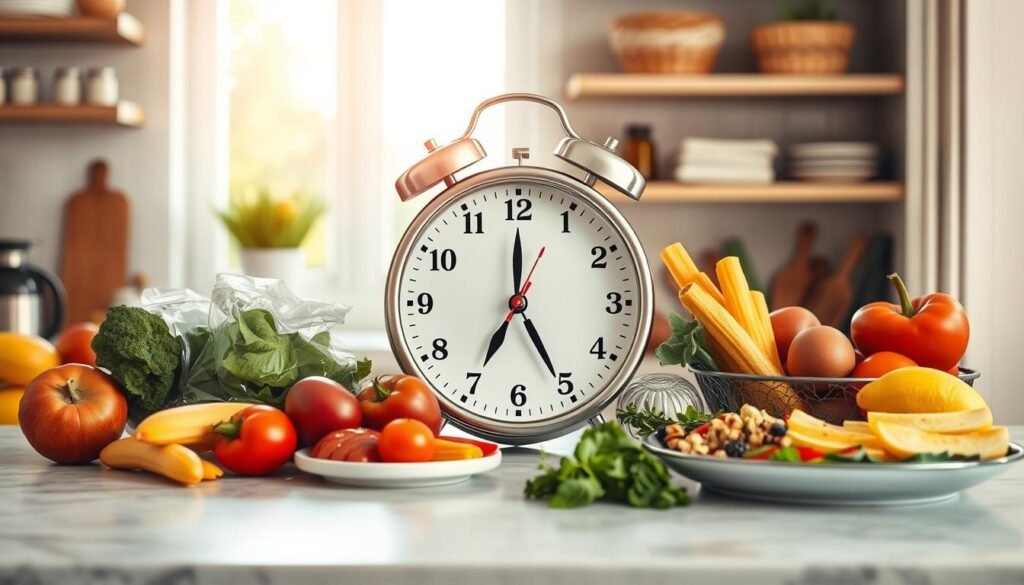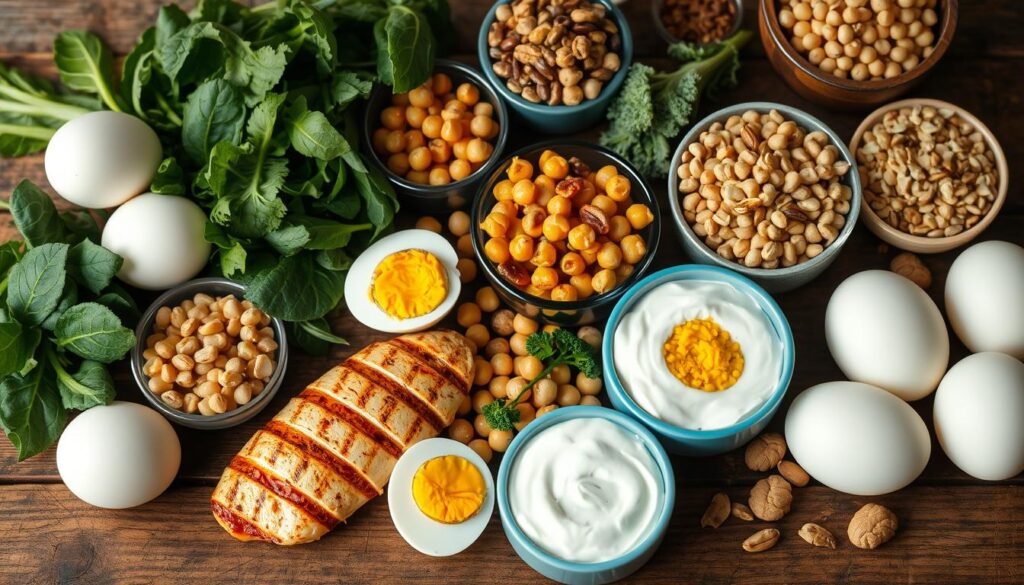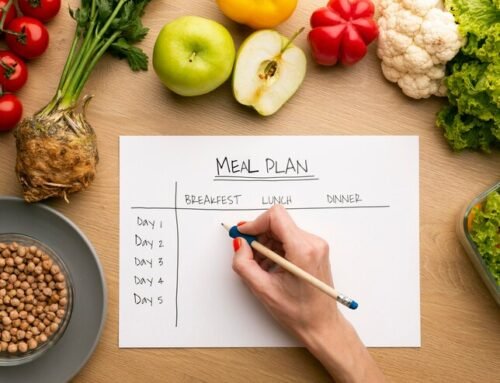Getting to a healthy weight can seem hard, but it’s doable with the right plan. This article shares tips backed by science to help you lose weight fast and safely. You’ll learn about eating in time blocks, making smart food choices, and how hormones and lifestyle affect your weight.
Unlike fad diets, these tips aim for lasting changes that boost your health. By understanding weight loss science and using proven strategies, you can start a journey to a healthier, more confident you.
Key Takeaways : Quick Weight Loss Diet
- Implement time-restricted eating and meal planning for sustainable weight loss
- Choose protein-rich, fiber-packed foods to stay full and curb cravings
- Understand the impact of hormones and metabolism on weight management
- Incorporate regular physical activity and lifestyle changes for long-term success
- Aim for a gradual weight loss of 1-2 pounds per week for optimal health
Understanding the Science of Quick Weight Loss Diet
Getting to a healthy weight is more than just a goal. It’s about knowing the science behind it. Let’s explore the main factors that help in quick weight loss diets.
The Role of Metabolism in Weight Loss
Metabolism is how our body turns food into energy. It’s key for managing weight. Our body’s internal clock affects how we eat and our metabolism.
Staying consistent with sleep and finding a balance between activity and rest helps. It boosts metabolism and aids in losing weight.
How Hormones Affect Weight Management
Hormones like ghrelin and GLP-1 control our hunger. When these hormones are out of balance, we might eat too much. This makes it hard to keep a calorie deficit, which is needed for weight loss.
Knowing how hormones affect our appetite helps us make better food choices.
Caloric Balance and Weight Control
Weight loss starts with burning more calories than we eat. This makes our body use fat for energy. But, it’s important to do it safely to avoid health problems.
Things like insulin and cortisol levels also matter. Insulin helps store fat, and too much cortisol can make us gain weight. A balanced diet and lifestyle can help our body manage weight better.
“Understanding the science behind weight loss is the key to developing effective and sustainable strategies for achieving your goals.”
Time-Restricted Eating and Meal Planning

Intermittent fasting focuses on when you eat, not what. It’s a popular way to lose weight. Time-restricted eating (TRE) limits your eating to 6 to 10 hours a day. It’s based on science and can help with weight management.
Studies show TRE can cut daily calories by 20%. For example, young men ate 650 fewer calories with a 4-hour eating window. It also leads to up to 5% weight loss in 2-4 weeks for those who are normal or slightly overweight.
TRE also offers health benefits. It can lower “bad” LDL cholesterol by over 10% and blood sugar by up to 30% in normal-weight people. It doesn’t hurt strength or endurance for those who exercise.
Meal planning is key for TRE success. Create weekly menus, make grocery lists, and stock up on healthy foods. Eating a big breakfast and small dinner can also help with weight management.
In summary, TRE is good for weight loss, heart health, and blood sugar. With good meal planning, you can reach your weight goals.
“Time-restricted eating may lead to up to a 5% weight loss over 2-4 weeks for normal-weight and overweight individuals.”
Smart Food Choices for Effective Weight Loss

Choosing the right foods is key to losing weight. High-protein, fiber-rich, and whole grain foods help you feel full. They also keep your muscles strong and blood sugar levels steady.
Protein-Rich Foods for Satiety
Protein keeps you full and stops you from eating too much. Wild Atlantic salmon is a great choice, with 16.8 g of protein per 3 oz serving. Eggs are also good, with two large eggs giving you 12.6 g of protein.
For a quick, protein-rich snack, try 7 oz of plain, low-fat Greek yogurt. It has about 20 g of protein and only 7 g of sugar.
Fiber-Packed Options to Feel Fuller
Foods high in fiber help you feel full and control blood sugar. Legumes like black beans, red kidney beans, and garbanzo beans are full of fiber. They offer 8.6 g, 6.9 g, and 8 g of fiber per ½ cup, respectively.
Whole grains, such as air-popped popcorn, also keep you full. A cup of popcorn has 1.2 g of fiber.
Healthy Food Swaps That Make a Difference
Swapping high-energy snacks for low-energy ones can help you lose weight. Instead of raisins (480 calories per cup), choose grapes (104 calories per cup) or grapefruit (64 calories per half).
Switching to whole grains instead of refined grains boosts fiber and keeps blood sugar stable. This simple change can make a big difference in your weight loss journey.
A diet rich in protein, fiber, and whole grains is powerful for weight loss. Smart food choices lead to feeling full, stable blood sugar, and better health.
| Food Item | Fiber Content | Percentage of Daily Value |
|---|---|---|
| Black Beans (1/2 cup) | 8.6 g | 31% |
| Red Kidney Beans (1/2 cup) | 6.9 g | 25% |
| Garbanzo Beans (1/2 cup) | 8 g | 29% |
| Air-Popped Popcorn (1 cup) | 1.2 g | N/A |
| Air-Popped Popcorn (2 cups) | 2.5 g | N/A |
Lifestyle Factors Beyond Food

Diet is key for weight loss, but other lifestyle factors matter too. Working on these can help you reach your goals and stay healthy.
The Importance of Sleep Quality
Good sleep is vital for managing weight. Not enough sleep can mess with your metabolism and hormones. This can make you hungrier and crave more. Try to sleep 7-9 hours each night to help your body stay in balance.
Stress Management Techniques
Too much stress can lead to weight gain. It changes your hormones and can make you eat more out of emotion. Try meditation, deep breathing, or yoga to handle stress better. These can help you eat healthier.
The Role of Physical Activity
Exercise is crucial for losing weight. Mix cardio, strength training, and flexibility exercises to burn calories and build muscle. Aim for 150 minutes of moderate activity each week.
By focusing on these lifestyle areas, you can manage your weight better. This approach supports your health and happiness for the long haul.
“Lifestyle patterns interact dynamically with various factors, emphasizing the need for a comprehensive understanding of their implications on health and disease.”
Also Read : Essential Diet Tips For Maintaining Caloric Balance In Your Body
Conclusion
Sustainable weight loss isn’t about quick fixes. It’s about making lasting changes in how you eat and live. Start with small, gradual steps that fit into your daily life. Avoid drastic or unrealistic goals.
Understanding how weight works is key. Eat foods that make you feel full and active. Keeping track of what you eat and how much can help too.
Weight loss is different for everyone. Always talk to health experts like dietitians or doctors. They can help you make a plan that’s right for you. By living healthy and making small changes, you can reach your weight goals and stay healthy for a long time.
FAQs
Q: What are some effective strategies to lose weight quickly?
A: To lose weight quickly, consider adopting a low-calorie diet, practicing intermittent fasting, and incorporating regular exercise. It’s important to focus on portion sizes and include plenty of fruits and vegetables in your diet for sustained energy and nutrient intake.
Q: Can intermittent fasting help me lose 10 pounds?
A: Yes, intermittent fasting can be an effective approach to lose 10 pounds. By limiting your eating window, you may reduce your overall calorie intake, which can lead to rapid weight loss when combined with healthy eating habits.
Q: Are fad diets effective for rapid weight loss?
A: Fad diets may result in quick weight loss, but they often lack essential nutrients and can be difficult to maintain. It’s advisable to focus on a sustainable eating plan that promotes steady weight loss rather than extreme diets that are likely to lead to regaining the weight.
Q: How much weight can I lose in a week with a low-calorie diet?
A: With a low-calorie diet, you can typically lose 1 to 2 pounds in a week. However, rapid weight loss may be possible if you combine it with exercise and a disciplined meal plan. Always ensure you are consuming sufficient nutrients.
Q: What are the health benefits of losing weight?
A: Losing weight has numerous health benefits, including reducing the risk of obesity-related diseases, improving heart health, and enhancing overall quality of life. A healthy diet and regular physical activity are key to achieving these benefits.
Q: How can I learn how to lose weight safely?
A: To learn how to lose weight safely, consult with a healthcare provider or a registered dietitian. They can help you create a personalized diet plan that considers your unique health needs and goals, promoting effective and sustainable weight loss.
Q: Is it feasible to lose 20 pounds in a month?
A: While it is technically possible to lose 20 pounds in a month, it is generally not recommended as it may not be a sustainable or healthy approach. Aim for a steady weight loss of 1 to 2 pounds per week for long-term success.
Q: What are the risks associated with rapid weight loss?
A: Rapid weight loss can lead to several health risks, including nutrient deficiencies, muscle loss, and gallstones. It’s important to approach weight loss with a balanced diet and realistic goals to minimize these risks.
Q: Can a systematic review and meta-analysis help understand weight loss methods?
A: Yes, a systematic review and meta-analysis can provide valuable insights into the effectiveness of various weight loss methods. They analyze multiple studies to determine which strategies are most effective for weight loss and overall health.
Q: What kind of diet provides the best results for weight-loss?
A: A diet rich in whole foods, including lean proteins, healthy fats, and plenty of fruits and vegetables, is often most effective for weight-loss. Combining this with reduced calorie intake and regular physical activity can help achieve and maintain a healthy weight.
Source Links
- https://www.everydayhealth.com/diet-and-nutrition/diet/tips-weight-loss-actually-work/
- https://www.mountsinai.org/health-library/special-topic/diet-for-rapid-weight-loss
- https://www.mayoclinic.org/healthy-lifestyle/weight-loss/in-depth/weight-loss/art-20047752
- https://www.webmd.com/diet/rapid-weight-loss
- https://www.healthline.com/nutrition/how-to-lose-weight-as-fast-as-possible
- https://www.health.harvard.edu/topics/diet-and-weight-loss
- https://www.medicalnewstoday.com/articles/322365
- https://www.healthline.com/nutrition/time-restricted-eating
- https://www.everydayhealth.com/weight-loss-pictures/foods-that-help-to-lose-weight.aspx
- https://www.mayoclinic.org/healthy-lifestyle/weight-loss/in-depth/weight-loss/art-20044318
- https://ijbnpa.biomedcentral.com/articles/10.1186/1479-5868-9-79
- https://garrowwellnesscenter.com/weight-loss-beyond-diets/
- https://pmc.ncbi.nlm.nih.gov/articles/PMC7663317/
- https://pmc.ncbi.nlm.nih.gov/articles/PMC6366252/
- https://www.ncbi.nlm.nih.gov/books/NBK221839/
- https://www.medicalnewstoday.com/articles/303409








Leave A Comment